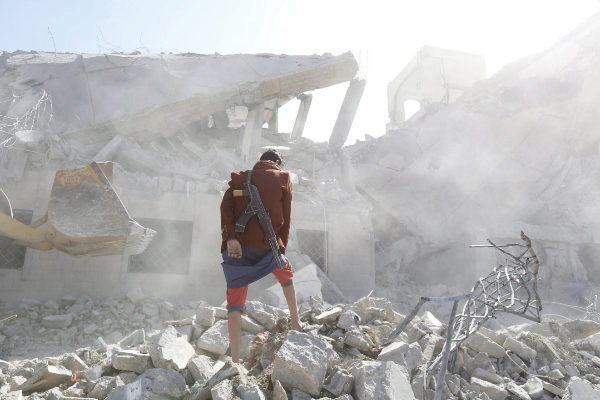- Conflict: Separatists in southern Yemen take Aden and open a new contest within the war
- War: Emirates reduces its military deployment in Yemen after four years of war
- Saudi Arabia: At least 26 injured in a missile attack by Yemeni Houthis against a Saudi airport
A chain of air strikes launched by the Saudi coalition over a school complex turned into a prison has left more than 100 dead in Dhamar, a city south of Sanaa, the capital of Yemen. The massacre, which has not yet provided definitive data on victims, occurs when the alliance of Saudi Arabia and the United Arab Emirates tries to stay afloat after clashes between local forces supported by both in the south of the country.
The complex reached by up to seven air strikes consisted of three buildings, in which the Shia rebel group of the Houthis kept about 170 prisoners confined, according to figures provided by the UN. "Witnessing this massive damage and seeing the bodies lying in the rubble has been a real shock," said Franz Rauchenstein, the head of the mission of the international committee of the Red Cross in Yemen, after visiting late this Sunday the place, located about 93 kilometers south of Sanaa.
Rescue work has continued since early Monday, with health officials and humanitarian assistance groups participating in the search for bodies trapped under the remains of the buildings. The teams took to arrive on the scene due to the repetition of the bombings. "People who are not an active part in a fight should not die in this way," Rauchenstein said. "It's a tragedy. The human cost of this war is unbearable," said Martin Griffiths, the UN special envoy in Yemen who has been trying to relaunch negotiations for months.
"The Yemenis deserve a peaceful future. This tragedy reminds us that Yemen cannot wait. I hope the coalition will open an investigation into this incident. Responsibility must prevail," the diplomat added. The Arab alliance that has been bombing Yemen since March 2015 insists that the facilities were used by Houthis to store arsenal, including drones and missiles launched daily on Saudi territory. "It is a legitimate military objective," they insisted after denouncing that it was not on the list of places that should not be attacked by the UN. The Shiite group that controls large areas of the country says that the enclave was a prison that had received at least two previous visits from the international committee of the Red Cross.
An extreme confirmed by the international organization itself. "The place attacked had been previously visited by the committee. It is a school that had been emptied and used as a prison for some time. The most disturbing thing is that the attack was on a jail. The prisoners are protected by international law." , Rauchenstein recalled. In addition to the hundred dead - a balance that could increase as debris removal tasks progress - about 40 survivors are being treated at nearby hospitals.
The attack is the nth that reaches vital and civil facilities of the poorest nation in the Persian Gulf, such as hospitals, markets, schools and even wedding halls. A year ago a bombing claimed the lives of 26 minors who were aboard a bus in a city controlled by the Houthis. The coalition says it has taken steps to prevent civilian casualties but human rights organizations and the UN accuse the alliance of maintaining their indiscriminate attacks in what is the largest humanitarian crisis on the planet.
According to UN figures, more than 10,000 civilians have died since the beginning in 2015 of the shelling of the Saudi coalition and 14 million civilians - half of the population - are on the verge of famine. Independent organizations, however, raise the number to more than 95,000 since the beginning of the conflict. According to the NGO Save the Children, about 85,000 children under five years of age could have died from famine or other diseases in the last four years. The timid start of conversations between the parties in Liza last December and the ceasefire agreed in Hodeida hang by a thread.
To the civil war, a scenario in which Saudis and Iranians wage their own battle for regional hegemony, a new front has been added in recent weeks: the outbreak of hard fray within the forces that, supported by Arabia Saudi and United Arab Emirates, so far controlled the southern city of Aden and faced the Houthis together.
Since then the southern separatists - funded, trained and supported by Emirates - and the government forces of President Abu Rabu Mansur Hadi - exiled in Riyadh - have starred in fighting that has left dozens dead and threatens to break the coalition. Emirates have even launched air strikes on allied weeks ago. Both countries have held meetings to save the alliance but, for now, the escalation continues to put at risk, in addition, the timid progress of the UN-designed peace plan.
According to the criteria of The Trust Project
Know more- Yemen
- Un
- Saudi Arabia
Middle East Separatists in southern Yemen take Aden and open a new contest within the civil war
IslamMore than two million Muslims fulfill the pilgrimage to Mecca
Wide Angle The laws of war turn 70

